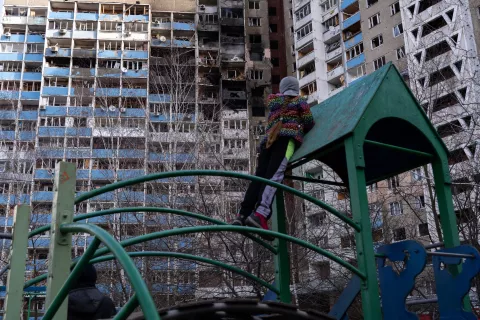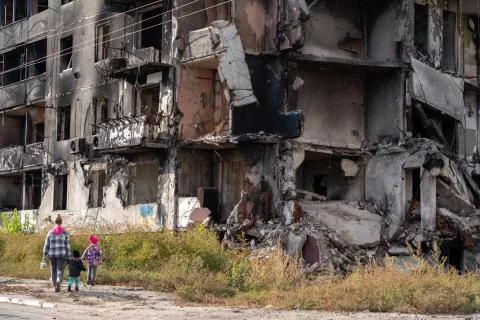Helping children cope with violence in Yemen
The ongoing conflict in Yemen has had a profound effect on the lives of children. In schools, students are learning how to use drama, sport and peer support skills to cope with the war and violence that surround them

- Available in:
- English
- Français
SANA’A, Yemen, 14 April 2016 – “Boom! Boom!” a girl yells, before she and four others dive to the ground in unison. A few minutes later, one of them starts screaming. The others rise to their feet and begin to calm her down. “You are ok, you are not hurt,” one of the girls says, comforting her classmate.
It’s morning in Yemen’s capital Sana’a. My colleagues and I arrived just in time to join students at the Al-Fadheela Basic School for their assembly, where the girls are acting out a scene reminiscent of their current reality. While the drama here excites the students, the actual situation in the country is perilous, especially for children.
>> Read the UNICEF report: Children on the Brink
“This is part of coping for the children,” says Mohammed Elfadili, the Director General of Education in Sana’a. “You can see them laughing and clapping as they watch the drama. Such activities and sports help them to temporarily forget about the war and concentrate on learning.”
As we walk into the head teacher’s office, Mr. Elfadili taps me on my shoulder and I look back. He points to my right side, where shards of glass are scattered on the ground.
“There was a lot when I first visited in November to assess the damage,” he says.
Repairing the damage
In the past year, Yemen has witnessed intensive bombardment and ground fighting. Civilian infrastructure including schools have been attacked, and children have been killed or maimed, some of them on their way to and from school.
The escalating conflict also forced the closure of nearly 3,600 schools and interrupted the education of 1.8 million children. Despite some improvements, more than 1,600 schools are still closed because of damage or insecurity, leaving about 387,000 children unable to resume their education.
Like more than 1,000 other schools in the country, Al-Fadheela School was damaged, though not directly. Residents say intensive bombardment on a nearby hill caused vibrations, shattering some of the windowpanes. With support from UNICEF, the school was able to replace and clean the broken windows, so that children can learn once again.
>> Read the UNICEF report: Education Under Fire

UNICEF is also supporting the rehabilitation of other schools across the country, as well as providing training for teachers and students to help children cope with the horrors of the conflict. Teachers are learning how to be more aware of children’s emotions to help them learn, while students are learning peer support skills, such as acting out scenes like the one at today’s assembly, which put smiles on all of their faces.
Dreams in the face of despair
After the morning assembly, the students go to their classes for lessons. Later, there is a sports period where they play games and do various other physical activities, including volleyball, hula hoop and skipping ropes.
It all looks normal – but it is far from it.
Ghadeer, a 13-year-old girl in grade nine, says it’s difficult to concentrate in class when the sounds of bombs and gunshots rattle through the air.
“Sometimes in the middle of a lesson, you hear ‘boom’. What can you expect?” she asked. “Some students scream, others run out of the class.”
Ghadeer wants to be a doctor. And although this conflict poses a threat to her education, she says it is now more urgent than ever that she achieves her ambitious dream.
“I want to treat all the people whether injured or sick. Each child in the school has a plan for the future and that is why those of us alive keep coming to school,” she says.
“Even in despair, our hope for a bright future is undiminished.”


